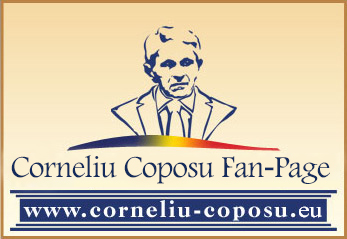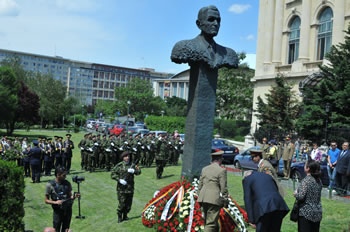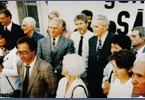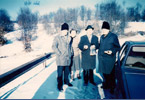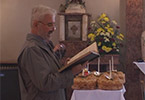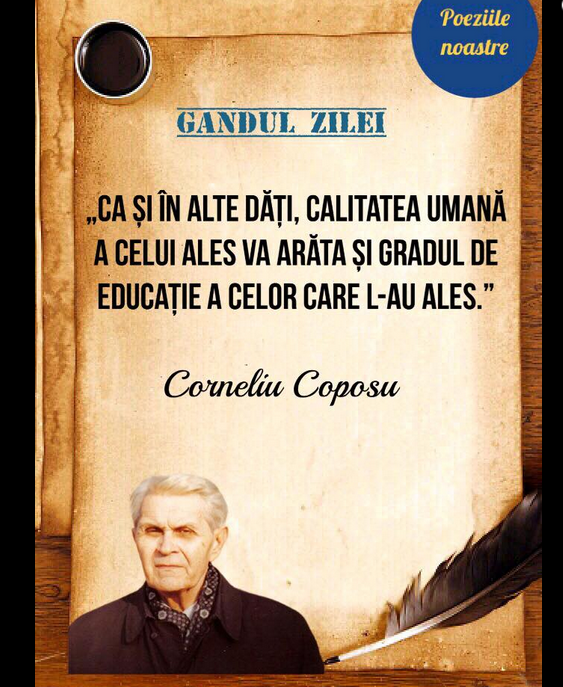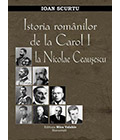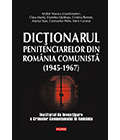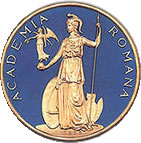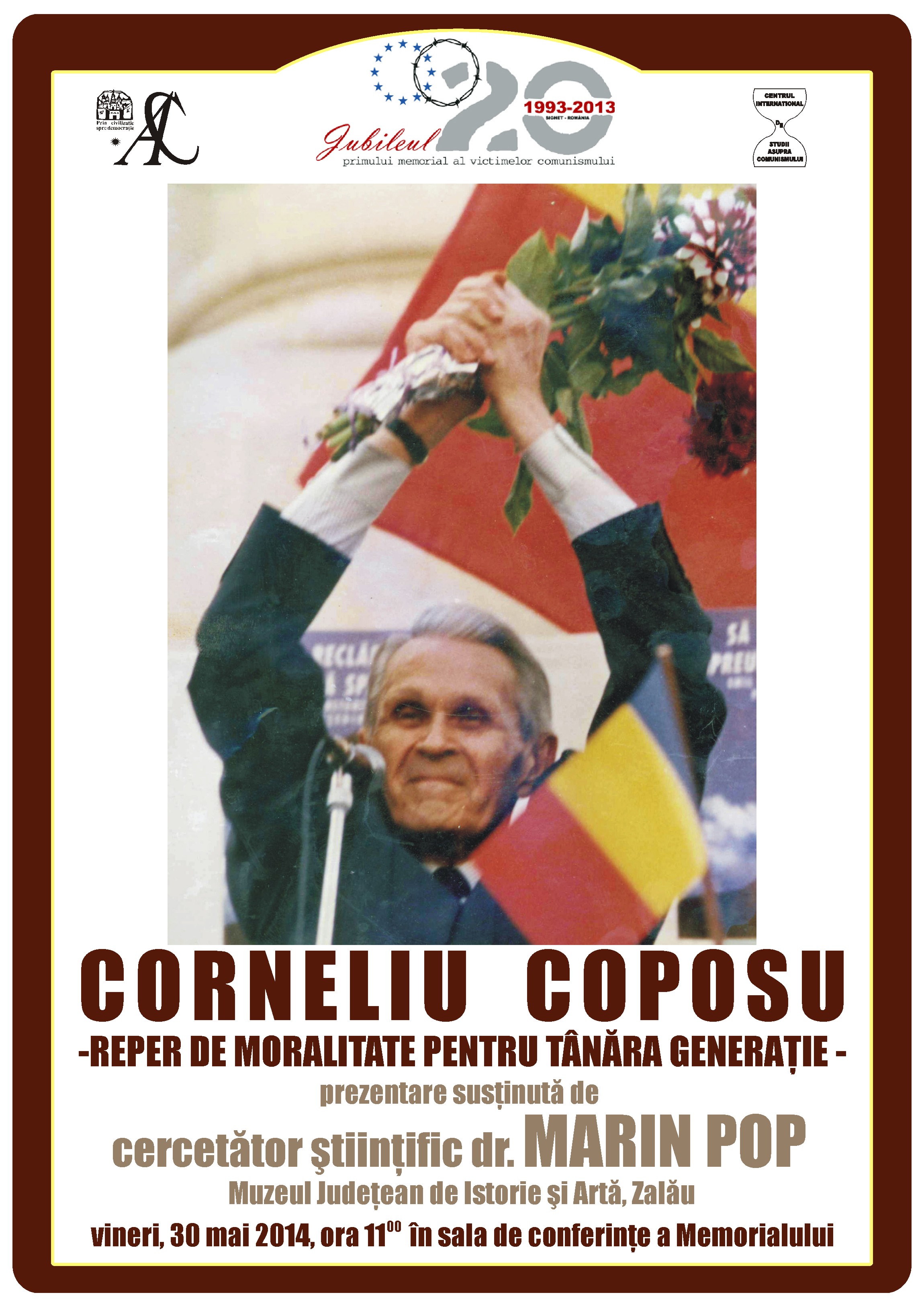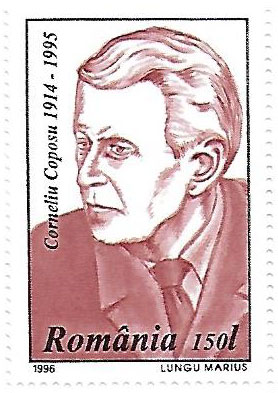20 May 1914
Born at Bobota, in Salaj county, the son of Greek-Catholic Archpriest Valentin Coposu and Aurelia, maiden name Anceanu.
The paternal grandfather, Grigore Coposu, was a priest, collaborator of Gheorghe Pop de Basesti. The maternal grandfather , Gavril Vaida de Glod, was a priest, primary cousin of Alexandru Vaida Voievod.
He grows and is educated in a family that develops an intense political activity for acknowledgement of the rights of Romanians in the Austrian-Hungarian Empire, by means of the Romanian National Party.
The father, Valentin Coposu, vigorous militant for affirmation of Romanian cause in Transylvania, had suffered numerous persecutions: had been imprisoned at Vac, Szegedin, Budapest, under accusation of high treason. Has been freed personally by General Mosoiu, on occasion of liberation of Budapest after the entry of Romanian army in the Hungarian capital. Valentin Coposu has been deputy in the Great Assembly from Alba Iulia since 1918 and voted for the Union.
The mother, Aurelia, daughter of united archpriest Iulian Anceanu and Cornelia, born Vaida, was the descendent of an old family that reunited the political-cultural and religious traditions of Transylvania’s Romanian medium. Aurelia Coposu has educated her five children: Cornel, Cornelia, Doina, Flavia and Rodica, in the spirit of Christian morals and authentic Romanian patriotism.
1919-1923
Elementary school in Bobota commune.
1923-1930
Sfantul Sava High School in Blaj.
The most important role in his further evolution played the approach and influence of the great artisan of the Union of 1918, Iuliu Maniu, that became his mentor and model along his entire existence.
1930-1934
Juridical and economic studies at the University in Cluj.
1935-1937
President of the PNT Youth Organization in Cluj, collaborator of “Romania Noua” newspaper, led by Zaharia Boila, “Mesajul” (Zalau), “Unirea” (Blaj), etc.
1937-1940
Permanent Personal Secretary of Iuliu Maniu, whom he accompanies in all political important missions and negotiations.
1940
Receives the title of political secretary of Iuliu Maniu, fulfilling this position until his and Iuliu Maniu’s arrest on 14 July 1947. In this capacity he accompanied him to all negotiations and treaties held with western negotiators and with leaders of political parties in the anti-Hitlerite coalition. It has been entrusted the secret cipher of diplomatic correspondence by which the Opposition negotiated the exit of Romania from the Axis and its return to the traditional allies. He had the mission to entertain confidential relations with representatives of the English government at Liverpool, with delegates of Romanian opposition that were having negotiations at Cairo, with Romanian emissaries at Stockholm and with the Military Allied Command in Italy (Foggia).
He moved to Bucharest after cession of Northern Ardeal. Collaborates to the weekly newspaper “Ardealul”, a publication of Transylvanian refugees. Also writes in the publications “Zorile”, “Dacia”, “Santier”, “Curentul”, “Cuvantul liber”, “Dreptatea” and others. Signs occasionaly with the pseudonim dr. C. Salajeanul.
1941
Meets his future wife, Arlette, daughter of General Marcovici and Jeanne Husser. The general participated in the cabinet of Maniu, in his first governing. They met in Constanta, where Maniu went to vacation to the French hotel held by Arlette’s grandmother.
24 October 1942
The marriage with Arlette Marcovici (She shall be arrested in 1950 and implied with her sister France in a false trial of espionage and after passing of 14 years of prison, she gets seriously ill out of prison and dies in 1965).
1945
President of PNT Salaj Branch. He is elected Deputy General Secretary of PNT. Delegate of PNT at the re-installment of Romanian authority activity in Northern Transylvania.
1946
He is promoted secretary of the Permanent Delegation, the leading body of the party.
14 July 1947 – is arrested together with entire leadership of PNT, after the frame-up of Tamadau, although he was not part of the group arrested there.
1947-1956
Stays 9 years in preventive arrest, without being judged. There is attempted his implication in numerous political trials, but couldn’t be sentenced because of lack of evidences.
1956
There is staged a trial of high treason. He is convicted according to communist practices to life hard labor for “high treason of workers’ class and crime against social reforms”.
1954-1962
8 years of severe regime of isolation at Ramnicu Sarat.
1962
Is seriously ill as consequence of extermination treatment applied to political prisoners.
1962-1964
Forced domicile in Baragan at Valea Calmatului in Rubla commune.
April 1964
He is freed after 17 years of prison in the prisons of Vacaresti, Jilava, Pitesti, Malmaison, Craiovs, Aiud, Ramnicu Sarat, Poarta Alba, Capul Midia, Canalul Dunare-Black Sea, Gherla, Sighetul Marmatiei, etc.
After 1964
Works as unqualified worker on construction sites, being employed by the Enterprise of Construction – Montage, Bucharest, the workshop of mechanics. He is permanently followed and periodically convened by Security.
Between 1964 – 1969 there are made 27 searches and are confiscated entire cupboards of documents and manuscripts.
1987
Affiliates the Peasants’ National Party, being in underground activity, to the Christian Democratic International, sending a letter to Jean-Marie Daillet, vice-president of the organization.
22-23 December 1989
Through a message-manifesto announces the re-entry of the Peasants’ National Party into the public life, later on becoming the Christian and Democratic – PNTCD.
After 1989 has been solicited on occasion of every major political event in Romania, to express his opinions in interviews taken by international radio posts: Europa Libera, BBC, Deutsche Welle, Vocea Americii and internal radio broadcasting posts. Has granted many interviews that appeared in the Romanian and foreign press.
28-29 January 1990
Actually becomes the leader of opposition against Frontul Salvarii Nationale, that sought to monopolize the executive and legislative power, confiscating the Revolution of December 1989.
Understanding that the Revolution has been stolen by the new “emanated” power, endowed with old totalitarian reflexes, Corneliu Coposu would take the hard mission of leading the Opposition in post-communist Romania. Beginning with the date of 29 January 1990, becomes the target of virulent campaign of press by which are launched rumors for his discrediting. The campaign would continue with the same intensity until after the legislative elections in April 1992.
July 1991
Faithful to the monarchic creed, he pays a visit to King Mihai I-st at Versoix in Switzerland. His connections with the sovereign and the royal family have continued until the end of his existence.
27 September 1991
He is re-elected president of PNTCD at the first Congress of the party.
1991-1993
President of the Romanian Democrat Convention. The idea of formation of the Convention belonged to him and he proposed that since 1990
April 1992
Together with other leaders of parties in the Opposition, men of art and culture, he meets His Majesty, King Mihai I-st de Romania, on occasion of the memorable royal visit to Romania, on the Sacred Easter in 1992.
27 September 1992
Following the elections, he becomes senator of Bucharest.
1992
Activates on international plane, among others in the capacity of member of the Council of the European Christian Democrat Union and in the Christian Democratic International; makes travels and takes part to various congresses of brotherly Christian Democratic parties (Great Britain, Luxembourg, Sweden, Greece, France, Switzerland).
Performs a tour of presentation of the candidate of Romanian Democratic Convention, Emil Constantinescu, to Belgium, Holland, Luxembourg, France, Germany and England.
February-March 1995
Pays a visit to the United States of America at invitation of the American Congress.
May 1995
He is appointed Officer of the Honor Legion, the highest decoration of the French Republic.
6 October 1995
The ceremony of awarding the Legion of Honor with rank of officer by the Ambassador of France at Bucharest, Bernard Boyer, at the headquarters of the Embassy of France at Bucharest on behalf of President Jacques Chirac.
11 November 1995
Dies at University Hospital in Bucharest, following a pulmonary neoplasm operated in 1994.
14 November 1995
He is buried at Catholic Cemetery Belu, without national funerals, but hundreds of thousand of Romanians come to accompany him on his last way.
